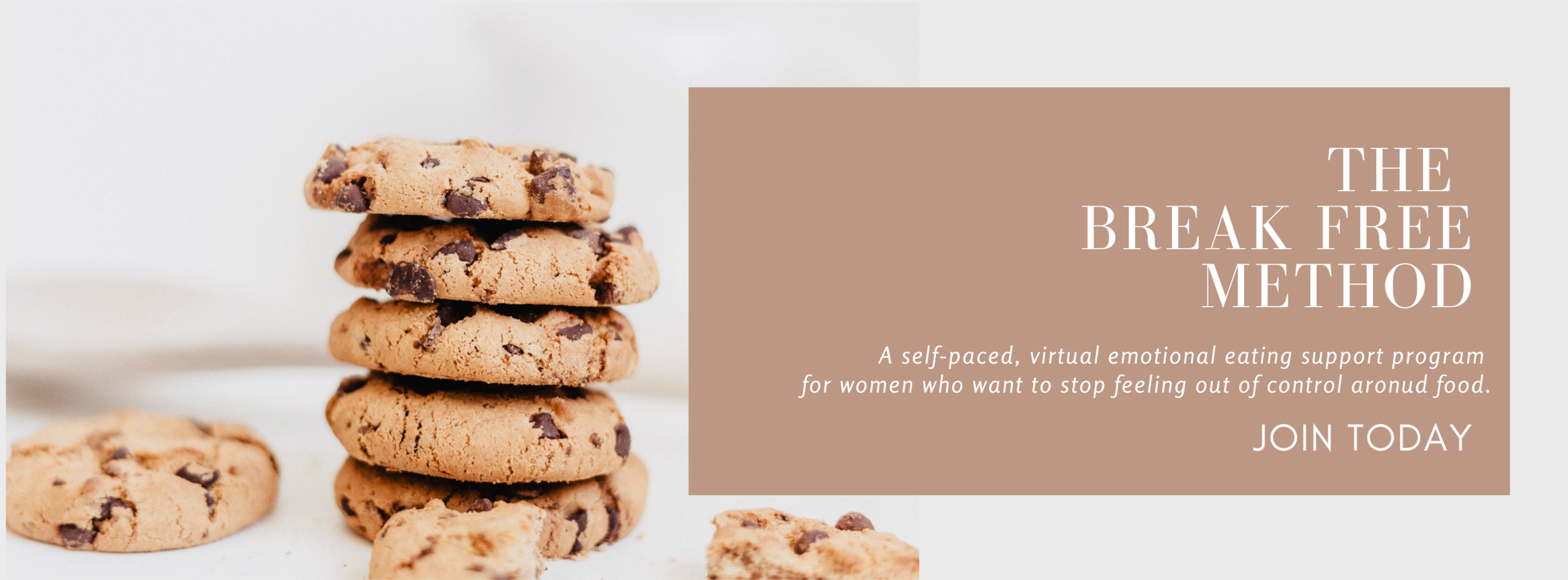How To Manage Stress Eating During a Pandemic
I’ve been hearing from a lot of people who are struggling with stress eating, emotional eating and boredom eating ever since the COVID-19 / Coronavirus pandemic hit. I just want to start off by saying that if you are struggling with any of the above, it is NORMAL.
Food is simply the most socially acceptable way we’ve been taught to cope with uncomfortable or intense emotions. I mean, all we have to do is grab the chocolate, chips or whatever quarantine snack you might have on hand to make the uncomfortable emotion go away. Simple, right? Sure … but sadly, it doesn’t address the root as to why you are stress eating.
Since this is the work I coach women through even when there’s not a pandemic (because let’s face it, emotional eating affects people all year round), I wanted to put together a resource for you to help navigate stress eating, emotional eating or boredom eating if you are being affected by them at this time.
If you are looking for further support beyond this, I am offering one-on-one “Emotional Eating Chit Chat” coaching calls at the reduced rate of $99 to provide you with the individualized support you might need during this time. You can book yours here.
Why You Might Be Stress Eating
One of the first steps to take when you discover that you’re engaging in stress eating, emotional eating or boredom eating is to normalize it.
Let’s be honest, most of us have never lived through a pandemic. Sure, there was SARS back in 2003, but we’ve never really experienced something on such a global scale that has us confined to our homes. So, can we just remember that first and foremost and be a little more compassionate with ourselves? If you’ve never lived through something, how can you possibly know how to cope?
If you are eating more than you usually do, or different compared to how you usually do, please know that it’s okay. You will be okay. Your body will get through this.
As I mentioned earlier, we have to remember that food is simply one of the most socially acceptable ways we’ve been taught to cope with challenges or uncomfortable emotions. If you cried as a kid, it’s more than likely that at some point, you were offered food to console you, be it a lollipop, ice-cream or dessert, because food has the ability to soothe us (albeit, always temporarily). So again, if you’re turning to food to cope right now, you’re simply responding in the way you were taught how to from a young age.
People tend to make stress eating a bigger deal than it is because we have an ingrained or innate fear of weight gain, and of course, if we feel “out of control” in our eating habits, or feel like we’re eating too much, that fear becomes activated. But take the meaning out of it – the fear of gaining weight – and stress eating simply becomes, stress eating; an act, a fact, a behaviour.
If anything, stress eating or emotional eating is actually helpful if we can learn to view it as a symptom of something that is out of balance in our life, or indicative of a need that isn’t being met.
After exercising compassion for yourself, I encourage you to exercise curiosity to understand what triggered your stress eating and what’s at the root of it.
Some possible triggers that may be contributing to stress eating might include:
Spending too much time in your fear-filled social media newsfeed
The fear and uncertainty of what lies ahead and what it means for businesses, the economy and your financial situation
Boredom, as a result of being laid off from your job
The stress of having your children home and caring for them 24/7
The pressure and uncertainty of how to support your child’s development with limited resources and capacity
The new routine of working from home
Navigating the grocery store with limited options
The fear of you, or a loved one, contracting COVID-19
Worry or frustration around not exercising or eating like you usually do
I listed those out, not to put more fear into your mind, but to help you identify what might be at the root of your stress eating, emotional eating or boredom eating.
Because once you can identify what’s driving your stress eating, you can start to take steps to manage them (the ones that are within your control, that is).
Strategies To Manage Stress Eating
While I’m going to talk coping strategies to deal with the triggers that are contributing to your stress eating at the moment, I want to highlight how important it is to FEEL your emotions.
We’re not really taught to sit in uncomfortable emotions. All you have to do is think back to the last time you cried in front of someone and how they responded by saying “it’s okay! don’t cry!”. People mean well by doing this (and hey, I’ve totally done this too!), but what’s happening is that it’s sending you the message that feeling uncomfortable emotions like sadness, anger, worry or fear are BAD. But none of them are bad – they just * are * what they are.
Part of managing emotional eating is learning to sit in this uncomfortable emotions, instead of going into auto-pilot to mask them with food. Again, if you happen to do this, IT’S OKAY. There are still days where I find myself turning to food even today and as someone who coaches people through this stuff. The difference is that I don’t make it out to being more than it is now or make it mean something about myself, like I’m “bad” for doing it. I simply use it as a cue to check in with myself and see where some needs might not be being met.
One of my favourite mantras from Fill Your Cup Podcast guest, Maria Juzwin, in episode 54 is “you need to FEEL it to HEAL it”.
Some things you can do to sit in your emotions and process them are:
Meditating
Breath Work (check out Jennifer Mansell – she’s been hosting absolutely beautiful and transformative virtual breath work sessions)
Journalling
Dancing (join me for a #QUARANTINEDANCEPARTY –click the link in my bio to find out when the next one is)
After that, you may find it helpful to start exploring how you can manage the things that you DO have control of that are currently acting as triggers for your stress eating.
For example, if you notice you are more likely to stress eat after going through your newsfeed that talks of nothing but how long this could potentially go on for, what will happen to the economy, what will happen to businesses etc., then maybe it’s time to take a break from the newsfeed and find one reliable source to turn to for information.
Or if you find you are bored throughout the day because either you’re working from home and have lost your normal work day structure, or you’ve been laid off and are trying to figure out how to fill your days, perhaps it would be helpful to make some sort of quarantine schedule for yourself that consists of things you’re excited about.
While I’m used to working from home having stepped into entrepreneurship 3+ years ago now, I’ve been making a point to incorporate fun things into my schedule, because well, let’s face it, being in self-isolation for days on end can get a little stale if you don’t. I’ve been having a lot of fun by picking up my guitar again, planning FaceTime dates with friends and family, making yummy meals in the kitchen and of course, hosting my Quarantine Dance Parties (you can get in on this week’s over here, or take a peek in my Instagram bio to find out when the next one is).
Additional Support For Stress Eating
If you are looking for more support for stress eating, emotional eating or boredom eating beyond this, I have a ton of helpful resources from podcast episodes, one-on-one consultations and blog posts:
Fill Your Cup Podcast Episode 55: Cup-Filling Solutions For COVID-19-related Stress Eating
Book a virtual therapy session through Better Help (save 10% off of your first month by clicking this link)
Download my FREE GUIDE: Satisfying Food Cravings Without The Guilt
If you have any further questions. or if there’s something I didn’t address in this post, please leave a comment below and I’d be happy to address it for you!
We will get through this and we will all be better for it. Trust and surrender, my babes xx.



